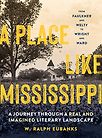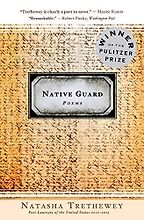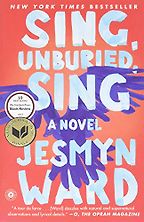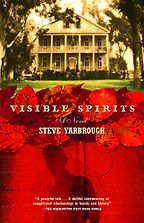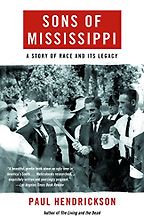A Mississippian-by-birth University of Mississippi professor, who has written three books about the state, seemed like the perfect person to ask for five books about Mississippi—and I love your list. Ever Is a Long Time, A Journey into Mississippi’s Dark Past, was your response to your young son’s question: “Daddy, what’s Mississippi like?” Can you give us a precis of your answer as a prelude to our discussion?
Mississippi is a place of great physical beauty with a very vexed and complex history, which many people simplify. I try to show the many layers of Mississippi’s story. Mississippi has spawned so many writers because the state has such a complicated story. Those of us who grew up there realize that we have a lot to explain.
Mississippi is associated, at least in northeastern minds like mine, with the original sins of the United States—the ethnic cleansing of Native Americans and slavery. Is it fair to think that your state is particularly implicated in those twin tragedies?
It’s the truth. We tend to focus a great deal on Mississippi as the locus of those sins. But it wasn’t just Mississippi that committed these sins. When I tell people I’m writing about my state, I say that I’m not just writing about the sins of Mississippi, I’m writing about the sins of America. Mississippi is an important part of the broader American story, particularly with regards to race. But slavery and the civil rights struggle are not the full story of Mississippi. There are many Mississippis.
I want to hear about all of them, but before we talk more, I wanted to ask whether any state came close to Mississippi in the proportion of population that was enslaved. On the eve of the Civil War 55% of Mississippians were African American and all but 1,000 among them were in bondage. Wasn’t the composition of Mississippi more like Caribbean nations, in terms of percentage of people enslaved, than other states?
Alabama might have been similar, and Louisiana was central to the slave trade. But it is true, as you say, that Mississippi had the demographics of a Caribbean nation and in many ways, a similar culture.
I’m currently writing about the clearing of the Mississippi Delta. The flat expansive landscape of Mississippi was a hardwood forest when settlers took it from native people, the land wasn’t cleared by settlers. That took an astounding number of people, many of them enslaved people. The very landscape of the state was made by the enslaved. Mississippians like to think of the Delta as a version of the frontier, which it was, but it was a place settled by people writer David L. Cohn described as “pioneers with means.”
The Mississippi Delta is associated in my mind with blues rather than just the northwest of your state. Why was the Delta such fertile ground for American music?
It was the settlement of the Delta and the plantation culture that came out of that place that led to the birth of the blues. The blues came from plantation culture. The blues, I would argue, is a critique of plantation life and Southern social structures. It’s a subversive music form, the music of the marginalized. Many blues lyrics are written in resistance to the structure of plantation life. After the overthrow of Reconstruction, black voices were silenced. The blues became an alternate form of community and a way to give voice to what couldn’t be said in the public square. That’s the source of that great music.
Your first selection gives voice to a unit of soldiers whose memory has been overwritten. Please tell me about the Pulitzer Prize winning collection of poetry by Natasha Trethewey, Native Guard.
I love Native Guard. Natasha says that poetry is “necessary utterance.” Native Guard is “necessary utterance.” It captures a story of Mississippi that had been effectively silenced: The story of African American soldiers who guarded captured Confederates. This is a story that complicates narratives about the South.
Five Books interviews are expensive to produce. If you're enjoying this interview, please support us by donating a small amount.
The poems are not only about this native guard. Many of them are very personal, like the poem ‘Miscegenation.’ Trethewey talks about how in Mississippi, where she grew up, her birth was a crime because interracial unions were forbidden by law. One of Natasha’s great themes is memory. It’s not only personal memory, but what we choose to remember about our cultural landscape as well as what we choose to forget.
Native Guard was also recommended in an interview on veteran’s books with Phil Klay, who underscored how Trethewey highlights effaced history. Up until 2020, your state flag was dominated by a Confederate symbol, and it is still dotted with monuments to Confederate war dead and what some referred to as ‘the lost cause.’ Please explain your state’s selective memory.
The ‘lost cause’ is a body of pathology, a pack of myths. Myths help us deal with complex aspects of our culture. They can be helpful until they obscure reality and keep us from seeing the truth. The myth of the “lost cause” really obscured reality. The reality is that the South did not secede for noble reasons. The Confederacy’s cause was slavery. As I said, a myth is problematic when it obscures reality; the cult of the ‘lost cause’ is problematic. It was a way for Southerners to avoid the ignominy of their loss and the immorality of their aims.
Jesmyn Ward’s widely-extolled Sing, Unburied Sing won America’s National Book Award and is your next recommendation
I love this book. It’s about how the past forms a person and a landscape. Spirits enter the story and haunt her characters.
Jesmyn captures the landscape so profoundly well. The character Leonie, one of the three narrators in the novel, is going to get her husband out of Parchman Farm, a maximum security prison in a corner of the Delta. Leonie’s husband calls the prison a place for the dead, which fits with the way other Mississippi writers characterize it. Parchman, I believe, is like a physical wound on the landscape of the Mississippi Delta. Jesmyn never describes Parchman as a wound, yet through the intimacy of her prose you sense that she feels the same way I do about the place.
The story migrates from the Gulf Coast to the interior of Mississippi.
And the book sheds light on how the Gulf Coast sees the rest of the state. People from the Gulf Coast say once you are above Forest County, it feels like a no man’s land because the intermingled Creole culture that distinguishes the Gulf Coast disappears above that line.
A haunting past is also the subject of Steve Yarborough’s Visible Spirits, next in your list of Mississippi books.
It’s based on the true story of an African American woman who became the postmistress of a town in the Delta and her struggle with assuming a position of an authority in a majority Black place that was dominated by white men. The story takes place in the fictional town of Loring, Mississippi, which is Steve’s native Indianola, Mississippi. We’ve known each other since we were 19. Because I know Steve so well, I know it’s based on that story and it’s also Steve’s way of confronting the place where he grew up.
It seems to be, in microcosm, the story of what happened after the Civil War, when inroads were made by African Americans and Black elected officials.
The post mistress whose story inspired Steve’s was appointed by President Theodore Roosevelt. After Roosevelt, President Woodrow Wilson effectively shut Black people out of the civil service. So, it is mirroring that story. The history and fictional world fit together. A friend of mine, Tommy Franklin, said “a good novelist lies his ass off but he tells the truth.” That’s what Steve does. He takes historical facts and builds a story around them to create a broader truth.
How heritage haunts is also the theme of many books by the author who is perhaps most identified with Mississippi, William Faulkner. Faulkner is far from the only Mississippian who has a firm place in America’s literary firmament, Richard Wright and Eudora Welty are just two others of many more. You wrote a book about literary Mississippi. Please tell me about it.
A Place Like Mississippi tells the story of Mississippi through its literature. When I was asked to write the book, my editor Will McKay said, I think this is a book that should begin in the Delta. My reaction was: absolutely not. The myth is that all of Mississippi literature springs out of the Delta. To dispel that myth, I began the book on the Gulf Coast with Jesmyn Ward and Natasha Trethewey, two African American women writing difficult things about the South. Then I move on through the state, using the geographic regions of the state to tell the story of its literature
I work up to Oxford, Mississippi, and William Faulkner. The book includes a photograph of 28 working writers living in Oxford, Mississippi, to show Faulkner’s legacy. It was inspired by a photograph of 57 jazz musicians in Harlem taken by Art Kane in 1958 and published in Esquire magazine. I end the book in the Delta at writing class in Parchman prison and examining the story of writers from prison, using the poems of Etheridge Knight, who’s from Mississippi. So, it’s a journey through the state, through its real and imagined landscape and through its literature.
Nonfiction is next on your list. A social history about another period many people particularly identify with Mississippi, the Civil Rights era. Please tell me about Paul Hendrickson’s Sons of Mississippi.
This book takes a photograph that was published in Life magazine of a group of white men gathered outside of a building at the University of Mississippi, where I teach today, during the tumult over the integration of the institution by James Meredith. One of the men holds a night stick or a baseball bat, suggesting they’re ready to do violence to resist desegregation. Hendrickson tracks down each man in the photograph and traces their stories since the photograph was taken. I love how the book tells the story of what happened outside of the frame of this photo.
Get the weekly Five Books newsletter
He also looks at how resistance to desegregation impacted the descendants of the men in the photo. He traces how the story got handed down to the next generation. It’s almost biblical, which is appropriate for the author who is a former seminarian. He asks if the sins of the father are visited on their sons and daughters.
Cynthia Shearer’s The Celestial Jukebox, your last Mississippi book recommendation, seems to be about new entrants to the Old South. Tell me about the books and why you recommend it.
I love teaching this book because it says so many things about Southern place and space. And it privileges the narrative of the outsider. One character, Boubacar, who came from Somalia, is learning to navigate the Delta. The jukebox which the title refers to lives in a small town grocery store owned by a Chinese immigrant, like a great many that once existed in the Delta. Shearer tells the story of newcomers to this small town and shows how the Delta looks through fresh eyes. I really admire Celestial Jukebox as a work of literature.
Finally, I wanted to ask for your understanding of a statement attributed to Faulkner, “To understand the world, you must understand Mississippi.”
First, Faulkner probably never said it. In My Mississippi, the writer Willie Morris assigned those words to Faulkner because, he said, he felt it was something that Faulkner should’ve said. Willie was on to something; that’s a lot of what Faulkner’s work is about.
There is so much in Mississippi, which Faulkner mined for his fiction, that can explain this country. It’s time that we stop thinking of Faulkner as a Southern writer or a Mississippi writer and start thinking of him as an American writer or an international writer. By getting readers to understand the complexities of a place like Mississippi, Faulkner helps us understand a lot about the rest of the world.
April 11, 2022. Updated: April 14, 2022
Five Books aims to keep its book recommendations and interviews up to date. If you are the interviewee and would like to update your choice of books (or even just what you say about them) please email us at [email protected]

